Perched on the rugged Aravalli hills, Sheesh Mahal Nahargarh Fort offers a mesmerising glimpse into Rajasthan’s regal past. This opulent palace, renowned for its stunning mirror work and intricate frescoes, reflects the grandeur of the Rajput era. As you step into its majestic halls, you’re transported back to a time of royalty and romance. The shimmering mirrors that adorn the walls and ceilings cast a spell of enchantment, making the Sheesh Mahal a true jewel among India’s architectural wonders. Discover the tales of intrigue and splendour that echo through its halls, promising an unforgettable journey through history.
Location
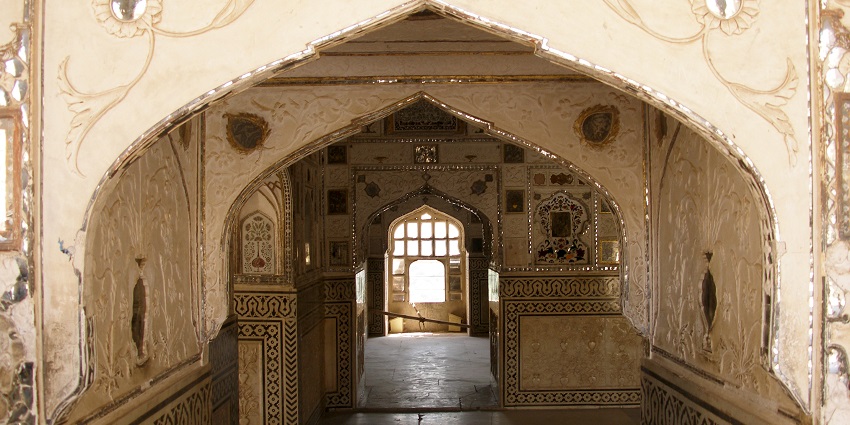
Photo: Vyacheslav Argenberg / Wikimedia Commons
Nahargarh fort Sheesh mahal is situated within the vicinity of the Fort itself, perched on the Aravalli hills near Jaipur, Rajasthan. This historic fort overlooks the vibrant city of Jaipur, offering panoramic views of the surrounding landscape. The serene and elevated position of the Sheesh Mahal provides a breathtaking backdrop that enhances its regal charm, making it a prime destination for history enthusiasts and architecture aficionados alike.
Suggested Read: Jaipur Forts
How To Reach Sheesh Mahal Nahargarh Fort
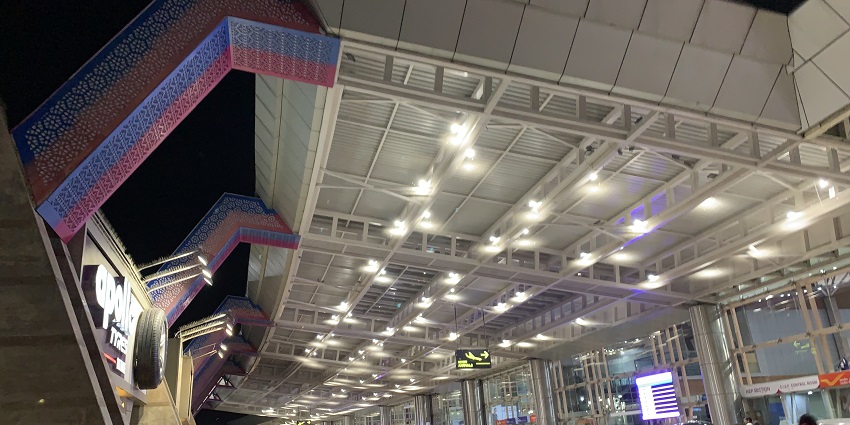
Photo: Chainwit. / Wikimedia Commons
Sheesh Mahal Nahargarh Fort can be reached through the following means:
By Air: The nearest airport is Jaipur International Airport (approximately 20 km away), well-connected to major cities.
By Train: Jaipur Junction Railway Station is about 15 km from the fort, with regular trains from various regions.
By Road: Accessible via private taxis or local buses from Jaipur, with well-maintained roads leading directly to the fort.
9 Places To Visit Around Sheesh Mahal Nahargarh Fort
Here are the list of places to visit nearby the Iconinc Sheesh Mahal in the vicinity of historic Nahargarh fort in Rajasthan.
1. Amber Fort
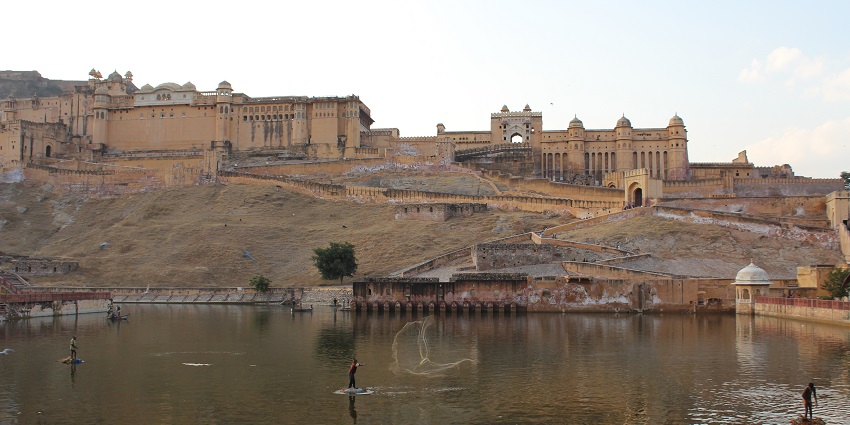
Photo: Arian Zwegers / Wikimedia Commons
Amber Fort, a majestic 16th-century fortress, showcases stunning Rajput architecture with its grand palaces, intricate courtyards, and beautiful gardens. Its blend of Hindu and Mughal styles makes it a must-visit. The fort’s lavish interior has mirrored hallways and elaborate carvings, and its advantageous location provides sweeping views of Maota Lake and the surrounding hills. The fort’s rich history, including its role as a royal residence and military stronghold, adds to its allure. Elephant rides and guided tours enhance the experience, making it a memorable adventure.
Timings: 8 AM – 5:30 PM
Entry Fee: ₹500 (approx. $6) for foreigners, ₹100 (approx. $1.20) for Indian citizens
Suggested Read: Amber Fort Elephant Ride
2. Jal Mahal

Photo: Firoze Edassery / Wikimedia Commons
The magnificent palace known as Jal Mahal, or the “Water Palace,” is situated within Man Sagar Lake. The palace, with its five floors submerged underwater, appears to float elegantly on the lake’s surface. Its Mughal architectural style, with intricately designed arches and balconies, adds to its charm. While entry to the palace itself is restricted, the surrounding area provides ample opportunities for photography and boat rides. The serene surroundings provide a calm diversion from the bustle of the metropolis.
Timings: 9 AM – 5 PM
Entry Fee: ₹50 (approx. $0.60) for Indians, ₹200 (approx. $2.40) for foreigners
3. Hawa Mahal
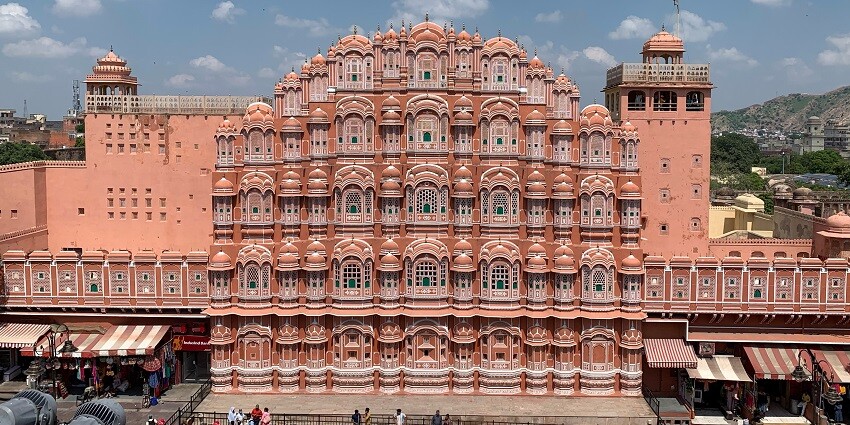
Photo: Chainwit. / Wikimedia Commons
Hawa Mahal, or the “Palace of Winds,” is famous for its ornate façade with 953 small windows that allowed royal women to observe street life without being seen. It’s a marvel of Jaipur’s architecture. The palace’s honeycomb-like structure and intricate latticework create a fascinating play of light and shadow. Its unique design not only provided ventilation but also allowed for a cooling breeze, making it comfortable during hot days. The museum inside offers insights into the palace’s history and its significance in the royal court. Its iconic appearance makes it a prominent symbol of Jaipur.
Timings: 9 AM – 4:30 PM
Entry Fee: ₹50 (approx. $0.60) for Indians, ₹200 (approx. $2.40) for foreigners
Suggested Read: Places To Visit Near Hawa Mahal For A Refreshing Escape
4. City Palace
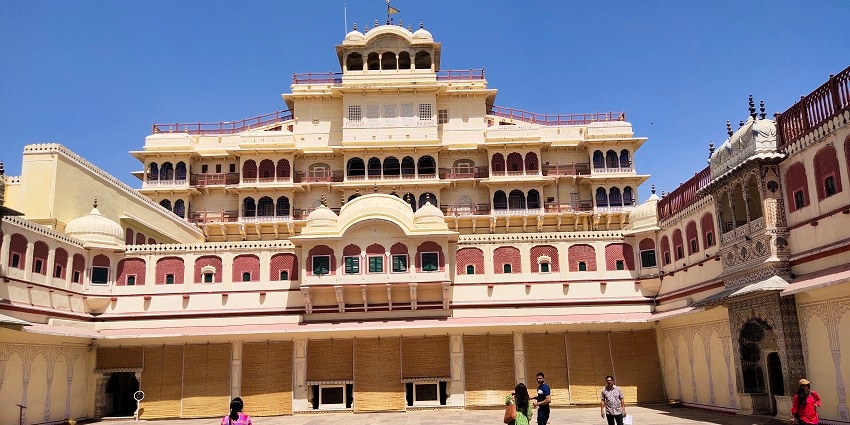
Photo: LIPIKA1704 / Wikimedia Commons
City Palace is a splendid complex featuring courtyards, gardens, and museums that provide insight into Jaipur’s royal heritage. The palace has an extensive collection of Rajput-era artwork and relics on display. The sprawling complex includes several courtyards, gardens, and buildings, each showcasing different architectural styles. The museum displays a vast array of royal costumes, weapons, and historical manuscripts. The palace also serves as the residence of the current Maharaja of Jaipur, adding a living historical dimension to the visit. Its elegant courtyards and regal halls offer a glimpse into the opulent lifestyle of the Rajput royalty.
Timings: 9:30 AM – 5 PM
Entry Fee: ₹500 (approx. $6) for foreigners, ₹150 (approx. $1.80) for Indians
5. Jaigarh Fort
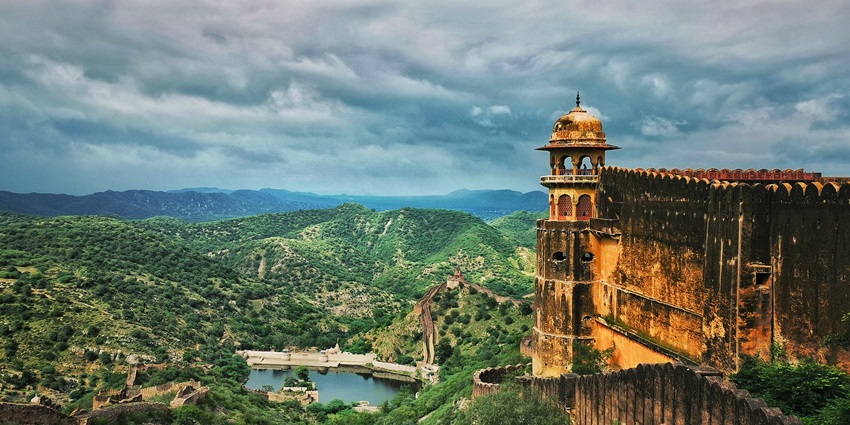
Photo: Luv sharma 02 / Wikimedia Commons
Jaigarh Fort, perched on the Aravalli Hills, is famous for housing the world’s largest cannon on wheels, Jaivana. This fort offers sweeping views of the Pink City and connects with Amber Fort via secret passages. A visit here provides a glimpse into Rajasthan forts, showcasing medieval defense architecture and the grandeur of Rajput rulers. It is one of the best places to visit in Rajasthan for history and photography lovers.
Timings: 9 AM – 4:30 PM
Entry Fee: ₹100 (Indians), ₹150 (Foreigners)
Suggested Read: Explore The Historic Jaigarh Fort Cannon
6. Jantar Mantar
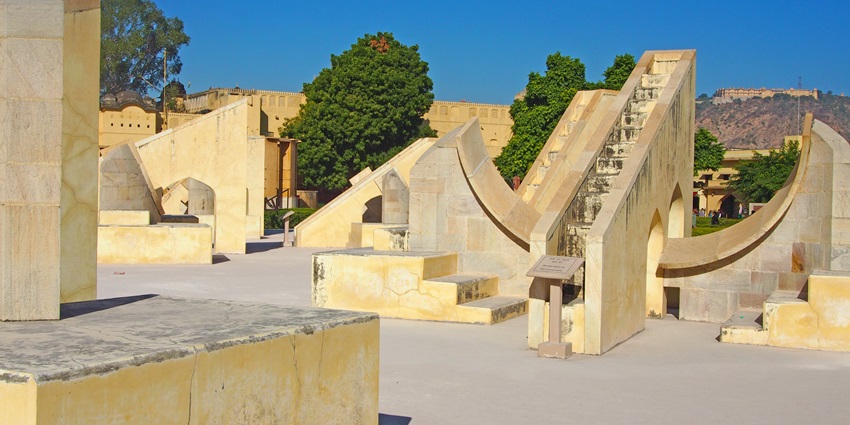
Photo: Prof Ranga Sai / Wikimedia Commons
A UNESCO World Heritage Site, Jantar Mantar is an extraordinary observatory built by Maharaja Sawai Jai Singh II. It features a collection of 19 astronomical instruments, including the world’s largest stone sundial. This site highlights the scientific advancements of 18th-century Jaipur. Visitors can learn about celestial calculations while exploring this architectural wonder. Its cultural and educational significance makes it one of the most enriching tourist spots near Nahargarh Fort.
Timings: 9 AM – 4:30 PM
Entry Fee: ₹50 (Indians), ₹200 (Foreigners)
7. Albert Hall Museum
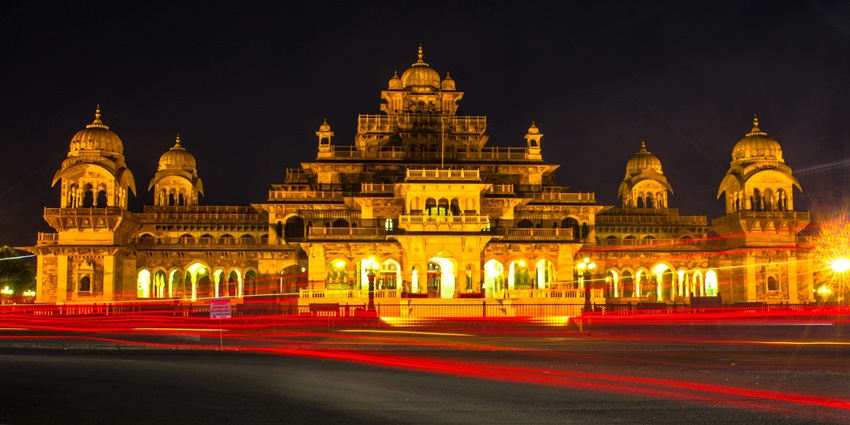
Photo: Rajesht9i / Wikimedia Commons
Albert Hall Museum is Jaipur’s oldest museum, located near Ram Niwas Garden. Built in Indo-Saracenic architecture, it houses rare artifacts, Egyptian mummies, miniature paintings, and ancient armory. Its illuminated façade at night creates a spectacular sight. For travelers interested in history and art, this museum offers a deep dive into Rajasthan’s heritage. It is one of the finest places to visit in Rajasthan for cultural exploration.
Timings: 9 AM – 5 PM
Entry Fee: ₹40 (Indians), ₹300 (Foreigners)
Suggested Read: Jaipur Museums
8. Birla Mandir Laxmi Narayan Temple
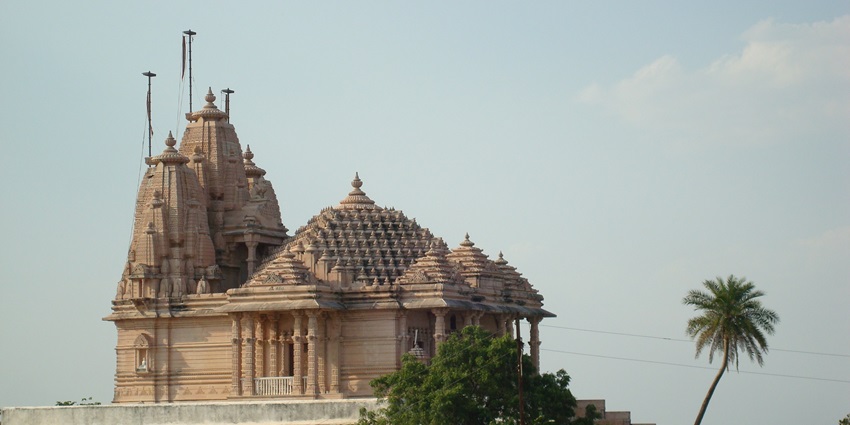
Photo: Aastha lall / Wikimedia Commons / Image For Representation Only
Birla Mandir, also known as the Laxmi Narayan Temple, is a stunning white marble shrine dedicated to Lord Vishnu and Goddess Laxmi. Located at the base of Moti Dungri Hill, it attracts tourists with its intricate carvings and peaceful surroundings. The temple looks especially magical in the evening when lit beautifully. A blend of spirituality and architecture, Birla Mandir offers a serene escape within Jaipur’s vibrant city life.
Timings: 6 AM – 12 PM, 3 PM – 9 PM
Entry Fee: Free
9. Sisodia Rani Ka Bagh
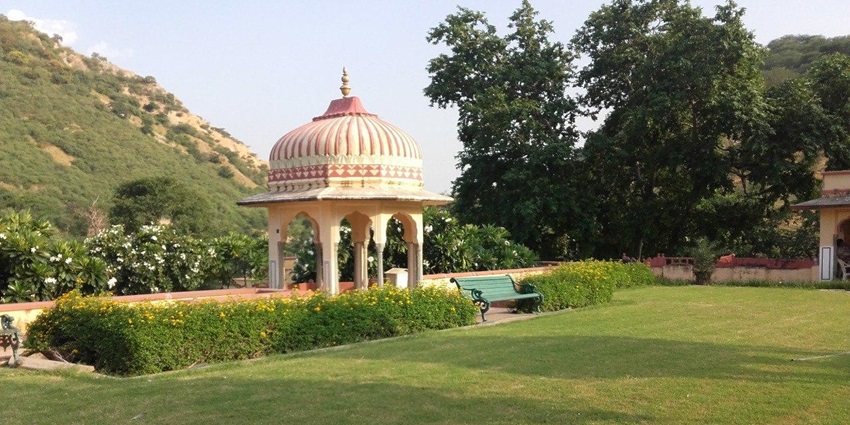
Photo: Akku09102004 / Wikimedia Commons
Sisodia Rani Ka Bagh is a beautifully landscaped garden palace built by Maharaja Sawai Jai Singh II for his queen. It features tiered gardens, fountains, and wall paintings depicting scenes from Radha-Krishna’s love story. Surrounded by hills, it is a refreshing retreat from the city’s hustle. Perfect for photography and relaxation, this site combines Mughal and Rajput garden styles, making it one of Jaipur’s hidden gems for travelers.
Timings: 8 AM – 5 PM
Entry Fee: ₹50 (Indians), ₹200 (Foreigners)
Suggested Read: Offbeat Places In Jaipur
Where To Stay
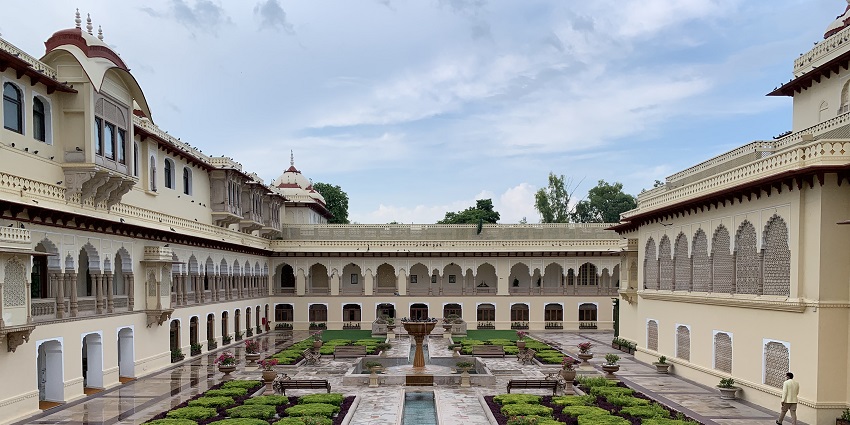
Photo: Chainwit. / Wikimedia Commons
For a luxurious stay near Sheesh Mahal, consider the Rambagh Palace, offering regal rooms and exquisite dining options just 10 km away. The Alsisar Haveli, with its charming heritage ambience, is another great choice. Budget travellers can opt for hotels like the Pearl Palace Heritage or a range of guesthouses in Jaipur. Each option provides easy access to the fort while ensuring a comfortable and memorable experience, blending historical charm with modern amenities. Many hotels also offer guided tours and transport services, enhancing your visit. Enjoy the local hospitality and soak in the city’s rich culture during your stay.
Where To Eat
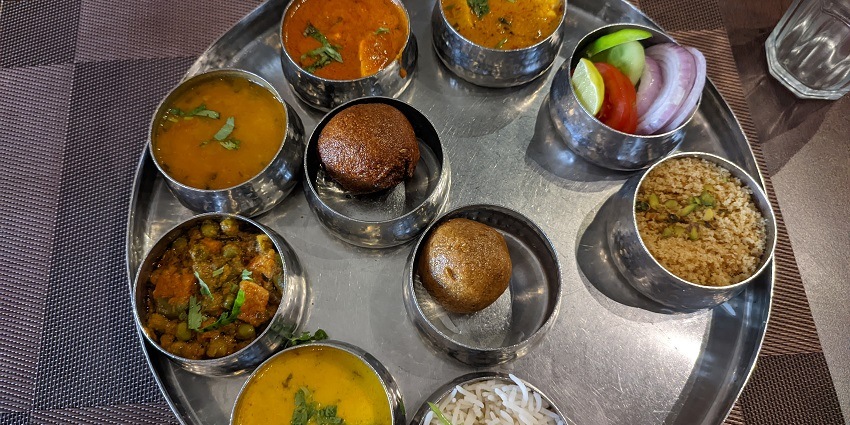
Photo: Kaapeine / Wikimedia Commons
Nearby, savour traditional Rajasthani cuisine at the charming Laxmi Misthan Bhandar or indulge in a royal dining experience at the Suvarna Mahal within Rambagh Palace. For a more casual meal, visit Rawat Misthan Bhandar for its famous kachoris and sweets. The Jaipur Cafe offers a cosy atmosphere with a mix of local and international dishes. Enjoy the vibrant street food scene with stalls offering local delicacies. Many restaurants also feature rooftop seating, providing stunning views of the city and a perfect backdrop for a memorable dining experience.
Suggested Read: Best Food In Jaipur
Best Time To Visit
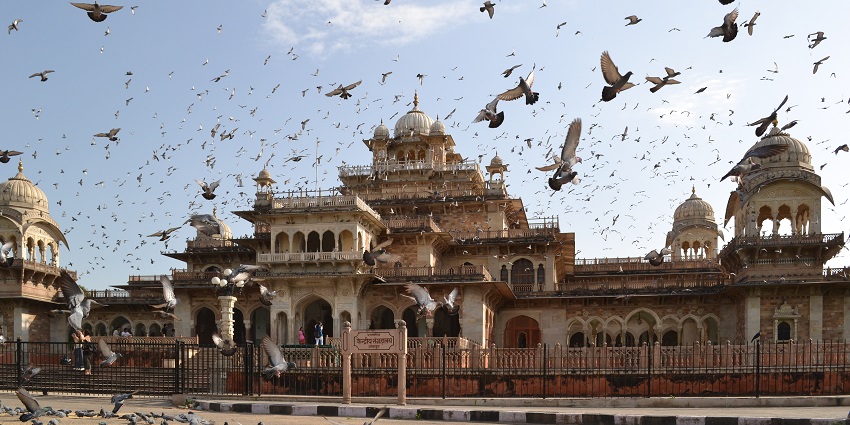
Photo: Chetan / Wikimedia Commons / Image For Representation Only
The ideal time to visit Sheesh Mahal is from October to March when the weather is pleasant and cool, making sightseeing comfortable. During these months, Jaipur experiences mild temperatures and clear skies, perfect for exploring the fort and its surroundings. Avoid the scorching summer months and the monsoon season, as extreme heat and heavy rains can hinder your travel experience. The winter season not only offers the best weather but also coincides with various cultural festivals and events, adding a vibrant cultural dimension to your visit. The whole experience is improved by the celebratory atmosphere.
Other Factors To Consider
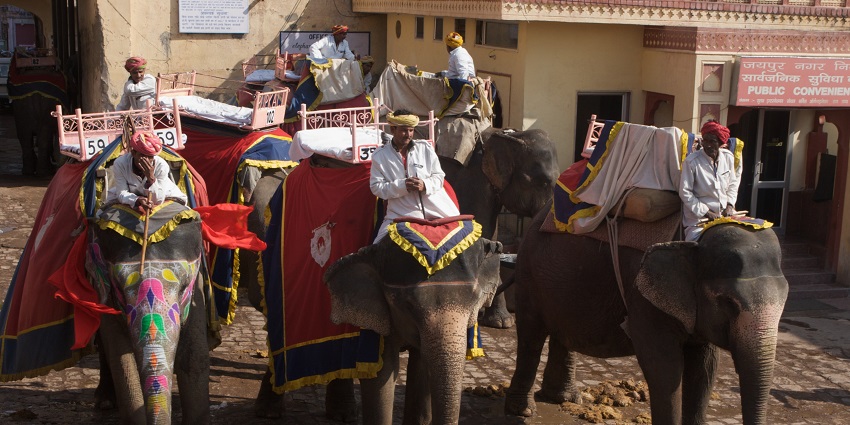
Photo: David Brossard / Wikimedia Commons
Keep these factors in mind to make the most of your trip to Sheesh Mahal Nahargarh Fort:
- Dress Code: Modest attire is recommended as a sign of respect for the historical and cultural significance of the fort. Lightweight, breathable fabrics are ideal given the warm temperatures.
- Footwear: Comfortable walking shoes are essential, as exploring the fort involves uneven terrain and staircases. Avoid high heels or sandals.
- Guided Tours: Hiring a local guide can enrich your visit with historical insights and stories, enhancing your understanding of the fort’s significance. The Nahargarh fort tickets price does not include the cost of guided tour of the fort
- Photography: Check for any restrictions on photography within the fort. Capture the stunning architecture and views while respecting local rules.
- Hydration: Carry water, especially during warmer months, to stay hydrated while exploring the fort’s expansive grounds.
Suggested Read: Places To Visit Near Jaipur For A Serene Retreat In Rajasthan
A visit to Sheesh Mahal at Nahargarh Fort promises an unforgettable journey into Rajasthan’s regal past. From the breathtaking views over Jaipur to the intricate architectural details, each moment here is steeped in grandeur. Whether you’re marvelling at the opulence of the Sheesh Mahal or exploring the surrounding attractions, the experience will leave you enchanted. Dive into the magic of this historical gem with TripXL, where every reflection tells a story and every step transports you to a bygone era!
Cover Photo: Anupamg / Wikimedia Commons


 WhatsApp
WhatsApp
 Twitter
Twitter









